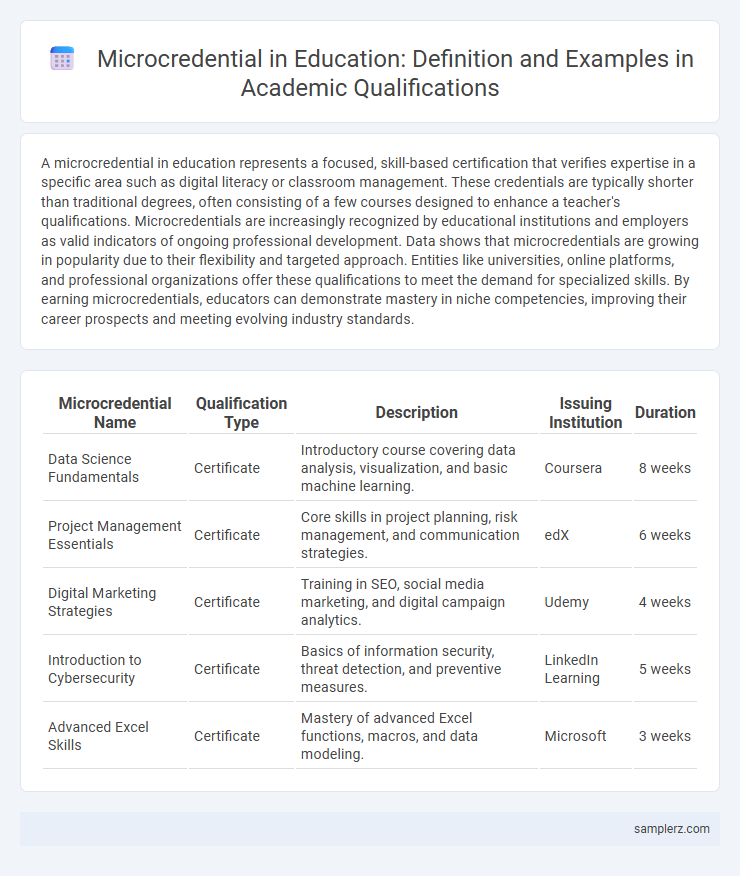A microcredential in education represents a focused, skill-based certification that verifies expertise in a specific area such as digital literacy or classroom management. These credentials are typically shorter than traditional degrees, often consisting of a few courses designed to enhance a teacher's qualifications. Microcredentials are increasingly recognized by educational institutions and employers as valid indicators of ongoing professional development. Data shows that microcredentials are growing in popularity due to their flexibility and targeted approach. Entities like universities, online platforms, and professional organizations offer these qualifications to meet the demand for specialized skills. By earning microcredentials, educators can demonstrate mastery in niche competencies, improving their career prospects and meeting evolving industry standards.
Table of Comparison
| Microcredential Name | Qualification Type | Description | Issuing Institution | Duration |
|---|---|---|---|---|
| Data Science Fundamentals | Certificate | Introductory course covering data analysis, visualization, and basic machine learning. | Coursera | 8 weeks |
| Project Management Essentials | Certificate | Core skills in project planning, risk management, and communication strategies. | edX | 6 weeks |
| Digital Marketing Strategies | Certificate | Training in SEO, social media marketing, and digital campaign analytics. | Udemy | 4 weeks |
| Introduction to Cybersecurity | Certificate | Basics of information security, threat detection, and preventive measures. | LinkedIn Learning | 5 weeks |
| Advanced Excel Skills | Certificate | Mastery of advanced Excel functions, macros, and data modeling. | Microsoft | 3 weeks |
Understanding Microcredentials in Modern Education
Microcredentials in modern education represent specialized, competency-based qualifications that validate specific skills or knowledge, often in digital formats. Examples include badges for coding proficiency, certificates in data analysis, or endorsements in project management offered by platforms like Coursera, edX, and LinkedIn Learning. These microcredentials enable learners to demonstrate targeted expertise and enhance employability in fast-evolving industries.
Popular Microcredential Programs and Their Qualifications
Popular microcredential programs such as Google IT Support Professional Certificate and Coursera's Data Science Specialization provide industry-recognized qualifications that enhance job readiness and skill validation. These programs offer targeted learning outcomes, often endorsed by employers, making them valuable for career advancement in technology and analytics fields. Completion of microcredentials like Adobe Certified Expert and HubSpot Content Marketing Certification signifies proficiency and practical expertise in specialized professional areas.
Microcredentials vs Traditional Degrees: Key Differences
Microcredentials offer targeted, skill-specific qualifications that emphasize practical competencies in a shorter time frame compared to traditional degrees, which provide comprehensive, theory-based education over several years. While traditional degrees often require broad academic coursework, microcredentials concentrate on measurable outcomes relevant to industry demands and rapid upskilling. Employers increasingly value microcredentials for their flexibility and alignment with evolving job market needs, contrasting the more static curriculum of conventional degree programs.
Industry-Recognized Microcredentials Examples
Industry-recognized microcredentials such as AWS Certified Solutions Architect, Google IT Support Professional Certificate, and Adobe Certified Expert validate specialized skills and enhance professional qualifications in technology and design sectors. These microcredentials are often developed in partnership with leading companies, ensuring alignment with current industry standards and demands. Earning these credentials can significantly boost employability and demonstrate mastery of specific competencies.
Microcredential Pathways in Higher Education
Microcredential pathways in higher education offer specialized certifications that validate specific skills, such as data analysis or digital marketing, enhancing employability and lifelong learning. Institutions like MIT and University of Melbourne provide stackable microcredentials, allowing students to combine short-term courses into recognized qualifications. These flexible credentials bridge gaps between traditional degrees and industry demands, accelerating professional development and skills acquisition.
Digital Badges: Leading Microcredential Qualification
Digital badges serve as a leading microcredential qualification by providing verifiable, skill-based evidence of competencies in digital literacy, coding, and project management. These credentials are recognized by educational institutions and employers, enhancing career prospects and lifelong learning pathways. Digital badges integrate blockchain technology for secure verification, ensuring authenticity and global acceptance.
Teaching Skills Microcredentials for Educators
Teaching Skills Microcredentials for Educators often include focused modules such as Classroom Management, Differentiated Instruction, and Assessment Strategies. These microcredentials provide educators with targeted, flexible learning opportunities to enhance specific teaching competencies and improve student engagement. Institutions like Coursera, EdX, and universities increasingly offer these credentials to support professional development and career advancement in education.
Technology Microcredentials: Trending Qualifications
Technology microcredentials, such as cybersecurity certifications, data analytics badges, and cloud computing endorsements, are rapidly gaining traction as valuable qualifications in the education sector. These microcredentials demonstrate specialized skills and knowledge that align with current industry demands, enabling learners to quickly upskill for technology-driven roles. Employers increasingly recognize these microcredentials as proof of expertise and commitment to professional development in cutting-edge digital fields.
Microcredentials for Career Advancement
Microcredentials in education, such as project management certifications or digital marketing badges, provide specialized skills that enhance employability and support career advancement. These targeted qualifications focus on industry-relevant competencies, enabling professionals to quickly adapt to evolving job market demands. Employers increasingly recognize microcredentials as evidence of continuous learning and practical expertise in specific career paths.
Global Adoption of Microcredential Qualifications
Microcredentials, such as the Digital Marketing Professional certificate offered by Coursera and recognized by universities worldwide, exemplify the global adoption of modular qualifications that address specific skills in high demand. Institutions like the European Commission and UNESCO promote frameworks encouraging governments and employers to integrate microcredentials into formal education systems to enhance lifelong learning and workforce agility. This global trend supports flexible, competency-based education pathways that bridge skill gaps across diverse industries and regions.

example of microcredential in qualification Infographic
 samplerz.com
samplerz.com